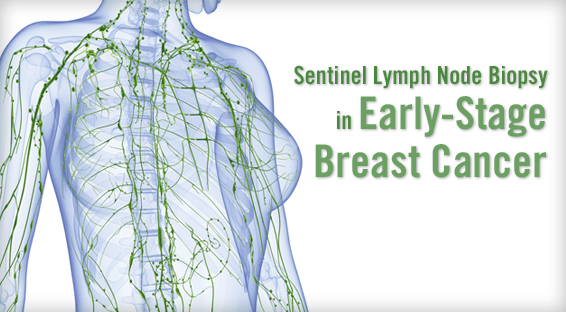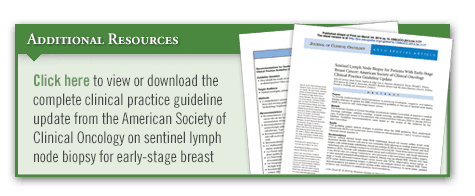In 2005, the American Society of Clinical Oncology (ASCO) first published evidence-based clinical practice guidelines for using sentinel node biopsy (SNB) in patients with early-stage breast cancer. In 2014, these guidelines were updated and published in the Journal of Clinical Oncology. “Since publication of the original guidelines, several new randomized trial results and additional cohort studies have become available,” says Gary H. Lyman, MD, MPH, who co-chaired the ASCO expert panels for both versions of the guidelines. “We now have more evidence from clinical trials supporting the use of SNB as a less invasive cancer-staging technique for a larger group of patients.”
Developing the Guidelines
To develop the guideline update, ASCO convened experts in medical oncology, pathology, radiation oncology, surgical oncology, guideline implementation, and patient advocacy. A systematic review of the literature published from February 2004 to January 2013 in Medline was conducted. The subsequent recommendations were based on a review of the evidence. The update also includes an appendix on technical issues related to pathology.
The ASCO guideline summarizes the updated literature search and analyzes new data related to the recommendations since the last systematic review. The update incorporates new evidence from more recent studies—including nine randomized controlled trials and 13 cohort studies—since 2005. Based on the results of these studies, more patients can now safely undergo SNB without axillary lymph node dissection (ALND).
“The guidelines can help clinicians determine for whom SNB is appropriate,” says Dr. Lyman. “This may enable more women with early stage breast cancer to avoid ALND, which is more invasive and is associated with a greater risk of complications.” ALND can cause a number of long-term side effects, such as pain and numbness in the arm and lymphedema. SNB is less invasive because only a few lymph nodes are removed and examined for signs of cancer.
Highlighting Key Updates
The guideline updates three key recommendations based on evidence from randomized controlled trials, according to Dr. Lyman (Table). “First, women without sentinel lymph node (SLN) metastases should not receive ALND. This can improve quality of life for women because it reduces their risk for lymphedema, infection, and vascular problems. Second, most women with one or two metastatic SLNs planning to receive breast conserving surgery with whole breast radiotherapy are not recommended to undergo ALND. Third, women with SLN metastases who will undergo mastectomy may be offered ALND.”
The guideline also updated two sets of recommendations based on cohort studies and/or informal consensus. SNB may be offered to women with multi-centric tumors as well as those with ductal carcinoma in situ (DCIS) who will have mastectomy. It can also be offered to those who had prior breast and/or axillary surgery and to those who had preoperative neoadjuvant systemic therapy. SNB is not recommended for women who have large or locally advanced invasive breast cancers (tumor size T3 or T4), inflammatory breast cancer, DCIS when breast-conserving surgery is planned, or in patients who are pregnant. The ASCO committee noted that evidence was insufficient to update previous recommendations in some cases.
Implementation & Research Needs
ASCO recommends that medical oncologists, surgical oncologists, radiation oncologists, and other care team members of cancer centers consider factors that may influence how the guideline update is implemented. Programs with cancer tumor boards or continuing medical education activities are encouraged to distribute and stimulate discussion of the guideline update. Dr. Lyman says these efforts may speed the sharing of the update and stimulate coordinated multidisciplinary care decisions. “We strongly encourage patients to talk with their surgeons and other members of their multidisciplinary team to understand their options and make sure all parties are on the same page,” he says. These discussions may also increase how quickly new studies and guideline updates are considered so that quality of care can be further improved.
Dr. Lyman says that more research is needed to enhance care for women with early-stage breast cancer. “We need more data to develop or improve recommendations related to several categories of patients in special circumstances,” he says. “This includes patients with very large tumors, those who are pregnant, and those who receive neoadjuvant systemic therapy.” ASCO outlines several other areas of research that should be explored in the future. Dr. Lyman notes that this research has the potential to inform medical decisions and improve cancer care so that all patients have the opportunity to receive the best available care for their specific situation.




 TimH
TimH